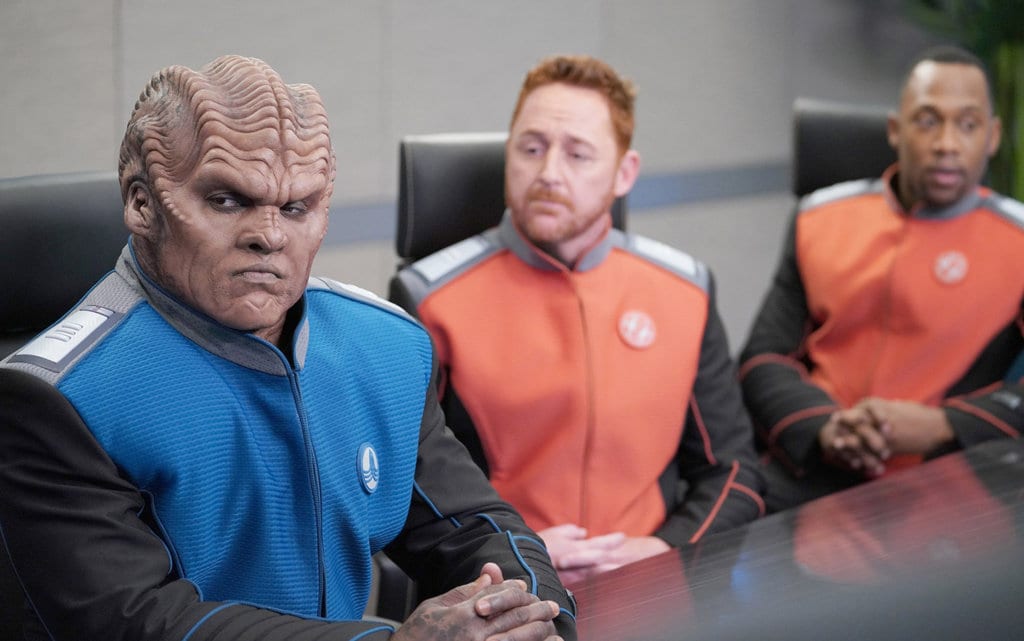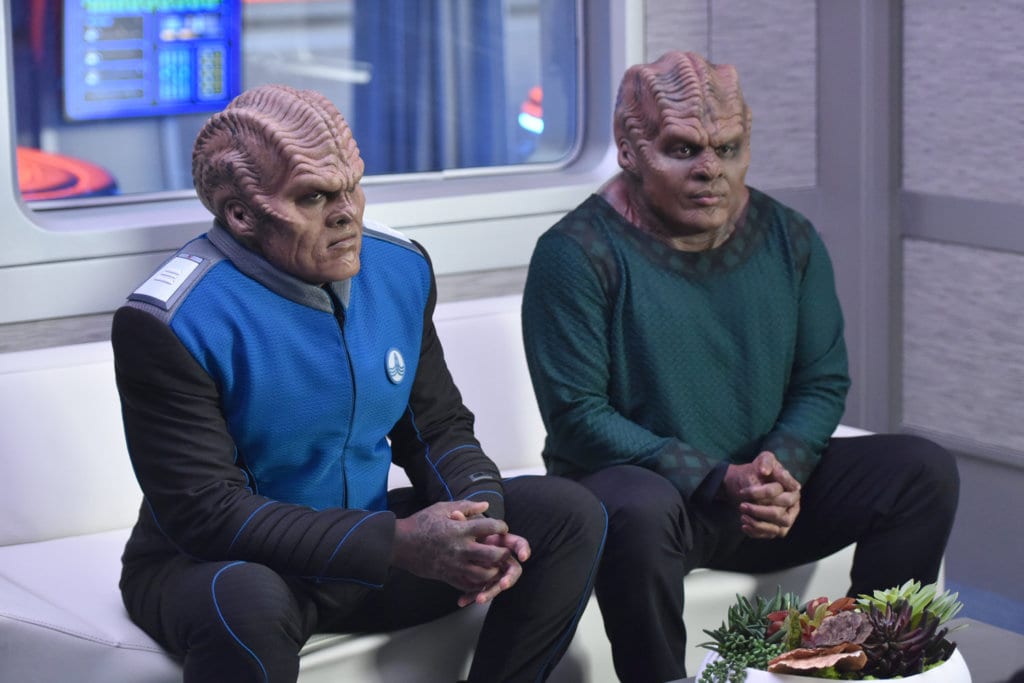REVIEW: The Orville – Season 2, Episode 2 “Primal Urges”
As with its first season, The Orville is kicking off its second run with two episodes in the first week. “Primal Urges,” airing in the show’s traditional time slot on Thursday night, is the lost episode from season one after Fox bumped it due to “scheduling.” It’s fairly easy to tell, too; there are no references to the events of “Ja’loja,” which were quite significant for the ship’s crew. (In an episode almost entirely about Bortus, you’d think he’d have mentioned his recent annual urination ritual.) It does, however, build on a plotline from the first season that, after the third episode, remained in the background. The choice to put “Primal Urges” where it is makes sense; it had to be aired early in the season before it would conflict too much with the new story threads, but it wouldn’t have worked as a season premiere. The good news is, since it’s mostly about Bortus and Klyden, it doesn’t break the continuity too much (maybe Lt. Tyler was sick this week). The bad news is that it is easily one the show’s lesser episodes.
Bortus makes a habit of leaving work early to spend time on the Environmental Simulator, causing strain in his marriage to Klyden. Ed once again finds himself having to reconcile Moclan culture with his own values. The Orville crew observes a planet about to be consumed by an exploding star but discovers the rock may not be as uninhabited as they thought.
*Spoilers*
Might as well out with it: “Primal Urges” is the porn addiction episode. Bortus continually requests to leave the bridge before the end of his shift, feigning sickness, but actually goes to the Environmental Simulator (which is what The Orville calls its version of the Holodeck) to enact his sexual fantasies. He neglects Klyden, not showing up for dinner and being disinterested in sex, giving the excuse that he is working late. Ed also notices that the typically diligent Bortus has been ducking out early. The metaphor is an easy one to grasp; Bortus’ playtime is gradually becoming an addiction, hurting his personal and professional life, and even when he begins to realize this, he can’t stop. Moreover, the simulations grow more extreme with each session, to the point where he is asking a lowlife crewman to get him a rare, under-the-radar porn program because even the rather dark scenarios he uses can no longer satisfy him. This new simulation – featuring a bevy of what I assume are attractive Moclans – comes equipped with a virus that cripples the Orville, and just when they need to mount a rescue mission on the doomed planet Nyxia.
The execution of the porn addiction plot is the biggest problem with “Primal Urges.” The metaphor is pretty obvious from the get-go, yet throughout the episode, the characters keep saying the phrase out loud, just in case the cheap seats don’t follow. The storyline could’ve easily spoken for itself, but constantly belaboring the point makes it tedious. Also making it tedious are the Simulator scenes themselves. I know they’re supposed to be disturbing to make the point that what Bortus is doing isn’t healthy, but they’re so creepy that I started turning away from the screen. At one point I was relieved to see “Primal Urges” cut to a commercial just as Bortus walked through the Simulator door, only to sigh when it picked up with his newest fantasy. Large parts of the episode are difficult to sit through, and I imagine most will want to get back to the subplot about the exploding star. (I think they’re also supposed to be funny, but I didn’t laugh – at least, not till later, when other crew members had to work around Bortus’ orgy program.) I was also expecting a little more from the metaphor when I first realized what was going on. Is the Environmental Simulator so realistic that it counts as actually cheating? Is the frequency of Bortus’ visits to the Simulator so great that it becomes cheating? Is all porn watching in a relationship cheating? People have very different opinions about these matters, and “Primal Urges” would have been a perfect vessel through which to explore them. Unfortunately, they’re ignored in favor of spelling out the addiction aspect.

It isn’t all bad, though. “Primal Urges” does use Bortus’ problem to expand upon his conflict with Klyden from season one. He began using the Simulator for sexual release because he has been unable to forgive Klyden for turning over their daughter for a sex change operation – which, by the way, was handled in a much more interesting and complex way than the porn addiction in this episode. This adds a very important wrinkle to the story, as suddenly Bortus becomes more sympathetic; I’m not typically someone who thinks a cuckolded spouse is to blame for their partner’s infidelity (which is why I get angry at Kelly’s constant deflecting of blame for her own cheating back to Ed), but what Klyden did to their baby, over Bortus’ strenuous objections, was pretty monumental. Klyden’s attempt to “divorce” Bortus is also a smart way of giving some clarity to his position as well; Klyden is, ultimately, a victim of his own backward culture, and Bortus’ understanding of the stabbing is the first indication that he may eventually be able to forgive Klyden.
The other indication is Bortus’ role in the rescue attempt on Nyxia. “Primal Urges,” for all its faults, brings the A and B plots together perfectly, using the love between the doomed First Minister and her surviving husband and children to remind Bortus of everything he has, and everything he stands to lose. His distaste at Isaac’s idea of choosing who will and won’t die based on intelligence shows him the value of clinging to one’s culture and ideals, just like Klyden did (although the circumstances are much different). It is through observing the nobility of sacrifice and the fleeting nature of tomorrow that Bortus rededicates himself to his family.

There are other virtues to the main plot of “Primal Urges.” While I didn’t care for the porn simulations, the couples therapy session with Claire is hysterical, and it brings some of the more important issues between Bortus and Klyden to the fore. I also enjoyed seeing Ed have to navigate another cultural hot potato, and his resulting exasperation at Moclan culture. (“This is… this is insane! I can’t have a normal ship with normal people? It’s gotta be all… stabby and…?”) Bortus’ explanation of sexuality to Isaac is quite apt. And the use of Ed and Kelly’s failed marriage as a cautionary tale is both funny and hopeful, for Bortus and Klyden as well as Ed and Kelly. This is where the displacement of “Primal Urges” may become a problem; several moments illustrate the bond between the captain and his first officer, the best one being the mixing of the clouds in their shared “day drink.” This isn’t necessarily a detriment, but given the events of Sunday’s “Ja’loja,” it feels a little out of place, and if the episode were kept where it was supposed to be, the hints at their connection would’ve carried more weight leading into the season one finale, “Mad Idolatry.” Regardless, the clouds joining is a beautiful image, as is the ultimate destruction of Nyxia, tragic though it is.
“Primal Urges” is far from a bad episode, but it is probably the worst one so far, suffering from its rescheduling, its off-putting (and too frequent) fantasy scenes, and its insistence on beating the central metaphor into the viewers’ heads. However, it does present some interesting moral dilemmas and a pair of gorgeous sci-fi images, and while the Simulator scenes miss the mark, other sequences are hilarious. Calling an episode of The Orville a must-watch is a no-brainer, but I don’t imagine many fans will be watching “Primal Urges” over and over.
The Orville - "Primal Urges"
Plot - 6.9
Acting - 9.1
Progression - 6.6
Production Design - 9.4
Comedy - 7.7
7.9
Good
“Primal Urges” is far from a bad episode, but it is probably the worst one so far, suffering from its rescheduling, its off-putting (and too frequent) fantasy scenes, and its insistence on beating the central metaphor into the viewers’ heads. However, it does present some interesting moral dilemmas and a pair of gorgeous sci-fi images, and while the Simulator scenes miss the mark, other sequences are hilarious.







